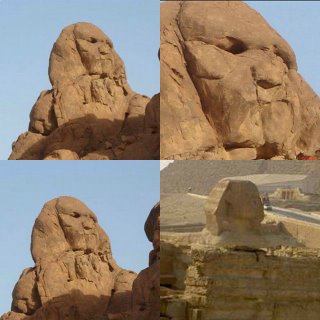From today's NYT, here are three editorials about Arabs, Moslems and America.
First:
Nicholas Kristof "
In Lebanon, Echoes of Iraq?"
The U.S. position on the fighting in the Middle East is essentially: “Stop the killing. But not yet.”
Washington is resisting an immediate cease-fire so as to give Israeli forces more of a chance to destroy Hezbollah. But more time isn’t likely to accomplish much militarily, while every day of grisly photos on Arab television strengthens hard-liners — and Iranian and Shiite influence — throughout the region.
The Israeli offensive and the American support for it seem to reflect the same misguided thinking that led to our Iraq war. It’s a utopian notion that every outrage must have a solution, and that armed intervention is a useful way to reshuffle the Arab political stage.
.....
.....
For now Israel’s Lebanon adventure is playing out a bit like America’s Iraq adventure. It is bolstering hard-liners (like Bashar al-Assad of Syria) and undermining moderates (like King Abdullah of Jordan), while handing propaganda victories to Iran and Shiite militants.
Second: Peter W. Galraith "
Our Corner in Iraq"
WHAT is the mission of the United States military in Iraq now that the insurgency has escalated into a full-blown civil war? According to the Bush administration, it is to support a national unity government that includes all Iraq’s major communities: the Shiites, Sunni Arabs and Kurds. O.K., but this raises another question: What does the Iraqi government govern?
.....
.....
While the Bush administration professes a commitment to Iraq’s unity, it has no intention of undertaking the major effort required to put the country together again. During the formal occupation of Iraq in 2003 and 2004, the American-led coalition allowed Shiite militias to mushroom and clerics to impose Islamic rule in the south, in some places with a severity reminiscent of Afghanistan’s Taliban.
.....
.....
The administration, then, must match its goals in Iraq to the resources it is prepared to deploy. Since it cannot unify Iraq or stop the civil war, it should work with the regions that have emerged. Where no purpose is served by a continuing military presence — in the Shiite south and in Baghdad — America and its allies should withdraw.
As an alternative to using Shiite and American troops to fight the insurgency in Iraq’s Sunni center, the administration should encourage the formation of several provinces into a Sunni Arab region with its own army, as allowed by Iraq’s Constitution. Then the Pentagon should pull its troops from this Sunni territory and allow the new leaders to establish their authority without being seen as collaborators.
.....
.....
This would be best accomplished by placing a small “over the horizon” force in Kurdistan. Iraqi Kurdistan is among the most pro-American societies in the world and its government would welcome our military presence, not the least because it would help protect Kurds from Arab Iraqis who resent their close cooperation with the United States during the 2003 war. American soldiers on the ground might also ease the escalating tension between the Iraqi Kurds and Turkey, which is threatening to send its troops across the border in search of Turkish Kurd terrorists using Iraq as a haven.
From Kurdistan, the American military could readily move back into any Sunni Arab area where Al Qaeda or its allies established a presence. The Kurdish peshmerga, Iraq’s only reliable indigenous military force, would gladly assist their American allies with intelligence and in combat. And by shifting troops to what is still nominally Iraqi territory, the Bush administration would be able to claim it had not “cut and run” and would also avoid the political complications — in United States and in Iraq — that would arise if it were to withdraw totally and then have to send American troops back into Iraq.
Yes, a United States withdrawal from the Shiite and Sunni Arab regions of Iraq would leave behind sectarian conflict and militia rule. But staying with the current force and mission will produce the same result. Continuing a military strategy where the ends far exceed the means is a formula for war without end.
Third:
John Tierney "
Another Man's Honor"
The result was a new honor system in the West, chivalry, that was an uneasy combination of Christian virtues and knightly violence. Eventually, with the decline of the aristocracy and the rise of the bourgeois and democracy, the system evolved into what Bowman calls honor-by-merit, epitomized by the Victorian ideal of the gentleman who earns his reputation by working hard, playing fair, defending the weak and fighting for his country.
The problem today, as Bowman sees it, is that the whole concept of defending one’s honor has been devalued in the West — mocked as an archaic bit of male vanity or childish macho chest-thumping. But if you don’t create a civilized honor culture, you risk ending up with the primitive variety.
“The honor system in Arab culture is the default honor system, the one you see in street gangs in America — you dis me, I shoot you,” says Bowman, a scholar at the Ethics and Public Policy Center. “We need a better system that makes it honorable to be protective of those who are weaker instead of lording it over them.”
When you’re confronted with an honor culture like the one in the Middle East, there are two rules to keep in mind. One is that you are not going to placate the enemy with the kind of concessions that appeal to Western diplomats. “Hezbollah is fighting for honor, to humiliate the enemy, not for any particular objective,” Bowman says. “Israel has no choice in what it’s doing. Nothing short of victory by either side will change anything.”
The other rule is that you’re not going to quickly transform an honor culture. The Iraq war was predicated on the assumption that democracy would turn Iraqis into loyal citizens with new civic virtues. But for now the old loyalties to tribes and sects still matter more than any universal concept of justice. The men would rather have honor than peace.









